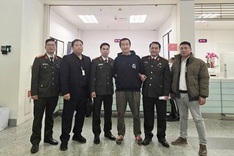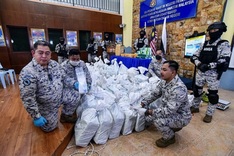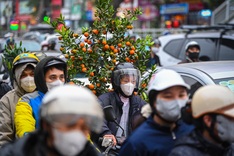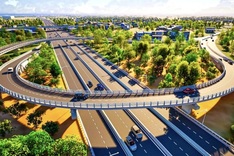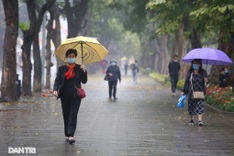Over the last three years, the people living along the Vu Gia – Thu Bon River have been struggling hard with floods in rainy season and facing the drought in the dry season.

Floods come rapid fire
According to Nguyen Minh Tuan from the Quang Nam provincial Storm and Flood Control Committee, the investors of the hydropower plants on the Vu Gia – Thu Bon river system all mentioned the benefits of the plants in regulating the water flow.
They can help stop, ease or delay floods in the rainy season, and provide more water in the dry season, thus better serving the water demand for industrial and agricultural production and providing enough clean water for the people in the lowland of Quang Nam and Da Nang.
“However, these are just in theory. In recent years, we have been struggling hard with floods and floods in rainy season when hydropower plants discharge water,” Tuan said.
In fact, the owners of the hydropower plants only prioritize the electricity generation and transmission, while they do not take care about regulating the water flow to help ease the floods in the lowland. That explains why the water reservoirs of many hydropower plants are very small if compared with the plants’ scale.
Nguyen Thanh Quang, Director of the Quang Nam provincial Department of Agriculture and Rural Development, has also said that the electricity generation efficiency has always been the top priority goal of hydropower plants. Therefore, the positive impacts of hydropower plants on the environment only can be seen in the environment reports the investors have to submit to obtain the investment licenses.
Chair of the Quang Nam People’s Committee Le Phuoc Thanh at the meeting with the owners of the investors expressed his worries about the operation of hydropower plants.
Thanh said the economic benefits generated by the hydropower plants would not be enough to compensate the losses the lowland people have to suffer from the unreasonable operation of hydropower plants.
Thanh has warned the investors that if hydropower plants’ operation affects people’s benefits, the Quang Nam authorities would propose the government not to allow the plants to accumulate water for power generation.
“In the past, hydropower plants discharged water at anytime they wanted. However, they now have to set up schedules in a reasonable way which allows to regulate the water flow,” Thanh said.
“Lowland people’s benefits should be the top priority, while economic benefit comes the second in the priority list,” he added.
Droughts devastate crops
Hydropower plants accumulate water in the rainy season, thus making the river sections in the lowland exhausted.
In July 2008, the A Vuong hydropower plant, when accumulating water for power generation, caused a serious drought in some localities of Quang Nam province and Da Nang City.
In July 2009, the equipment maintenance at A Vuong hydropower plant caused unexpected lack of water at the An Trach dam, thus seriously affecting the agricultural production and people’s daily life to the Dai Loc, Dien Ban, Hoi An districts and Da Nang City. At that time, 5000 hectares of the summer-autumn crops did not get enough water.
A lot of troubles occurred in the last few years, including the ones which raised serious controversy among relevant parties – Da Nang City, Quang Nam province and the Ministry of Industry and Trade.

